Organic chemistry is one of the most demanding courses you’ll take as a science student.
You’ll have to learn a massive amount of organic compounds and their chemical properties and reactions.
What’s the one thing that can make a difference between a passing and a failing grade? A good organic chemistry textbook.
The best organic chemistry textbooks explain complex topics, give good examples, and include a lot of practice materials.
I’ve spent countless hours researching organic chemistry books, and I’ve consulted with organic chemistry students to bring you a comprehensive list of textbooks, as well as a guide on how to choose the best one for you.
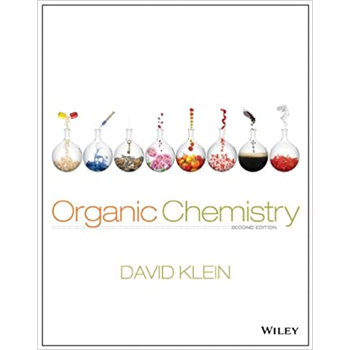
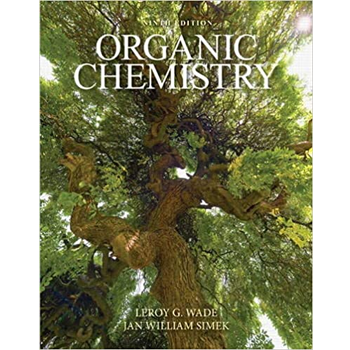
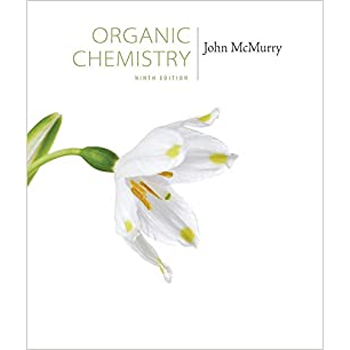
Our Top Organic Chemistry Products
1 - Klein Organic Chemistry

If you’re looking for an introductory organic chemistry textbook, the Klein Organic Chemistry textbook could be the one for you.
Klein uses a skills-based approach — the author introduces and builds on the common organic chemistry concepts.
This book stands out because the development of skills is emphasized, which is why many professors teaching organic chemistry courses believe this book has the best approach to organic chemistry.
The book includes both end-of-chapter problems and throughout the chapter, wherever it may be helpful for the student.
The problems are presented continuously in the “Apply the Skills” and “Practice the Skills” areas, using skill builder examples.
It is also a good book for medical students because there are “Medically speaking” boxes throughout the book. They explain the pharmaceutical examples of organic chemistry.
Finally, what makes this a great organic chemistry book is a large number of figures and diagrams. These are colored, so it’s easy for a student to see the shapes of different kinds of bonds.
- Great for organic chemistry beginners
- Has many colorful visuals
- Clear and concise explanations
- End-of-chapter problems so you can assess your level of understanding
- Could have more examples of foreign concepts
2 - Organic Chemistry (MasteringChemistry)

Best organic chemistry textbook #2 is Organic Chemistry (MasteringChemistry) by Leroy G. Wade and Jan W. Simek.
It is the book’s 9th edition, and it contains updated content and homework problems.
At the beginning of each chapter, there’s a picture that shows how the concepts of that chapter are related to the real world.
It helps students realize they are learning relevant material.
It’s another good option for students just starting to learn organic chemistry, as the book aims to help the students not only memorize but understand and apply the materials.
The authors cover the organic chemistry fundamentals, so it can be used as a text before class.
It’s an introduction to organic chemistry, as well as a comprehensive study guide when preparing for an exam.
The book has Mechanism and Application boxes.
Mechanism boxes help students learn how reactions happen, while Application boxes show students how the reactions are used in real life.
- Includes synthetic organic chemistry
- The book will follow the pace of an organic chemistry course
- Includes problem-solving strategies
- Graphics could be better, especially design and formatting
3 - Organic Chemistry

Organic Chemistry by John McMurry is another book many organic chemistry professors recommend.
McMurry’s textbook is a great tool for learning organic chemistry because he concisely explains basic organic chemistry concepts and gives clear explanations and examples.
This book is also in its 9th edition, and over the years, it has become thicker, as it covers more advanced organic chemistry concepts.
"I wrote this book because I love writing. I get great pleasure and satisfaction from taking a complicated subject, turning it around until I see it clearly from a new angle, and then explaining it in simple words."
- John McMurry, Book Author
One thing to note is that there could be more practice exercises, especially exercises with greater difficulty.
Also, compared to the first two books on this list, McMurry doesn’t give tips on tackling more complex problems.
- Concise and clear writing
- Good for an introductory organic chemistry course
- Color diagrams help illustrate the concepts
- Not best for premed students as it includes simplistic problems
4 - Organic Chemistry: Structure and Function
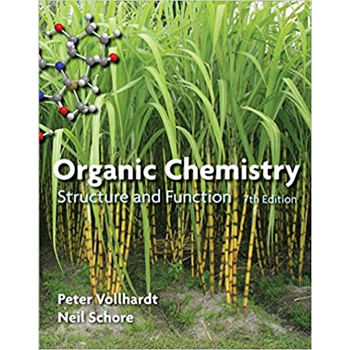
The Organic Chemistry: Structure and Function textbook is another common requirement for an organic chemistry class.
The authors, Vollhardt and Schore, are both well-known researchers and educators.
They take a functional approach to organic chemistry and emphasize understanding how the molecule will function in a chemical reaction.
They believe that by understanding the link between structure and function, the students will understand mechanisms and then be able to solve problems.
It is one of the best organic chemistry textbooks for beginners because it’s systematic, offers clear explanations, and contains relevant exercise problems.
All concepts typically covered in organic chemistry are included here, such as reaction mechanisms. The authors also go deeper and explain what happens in organic reactions.
Note: The authors use IUPAC nomenclature [1]. This means, for example, they use propanone and not acetone.
Also, the book has answers for in-house questions, but not end-of-chapter ones, which make about 95% of all practice questions.
- A good reference organic chemistry textbook — explains the basics and also goes into details
- Has practice problems suitable for aspiring chemists
- Uses common names, so you won’t be confused by systematic notations
- Doesn’t have answers for most of the end-of-chapter questions, so you’ll have to buy the solutions manual separately
5 - Clayden Organic Chemistry
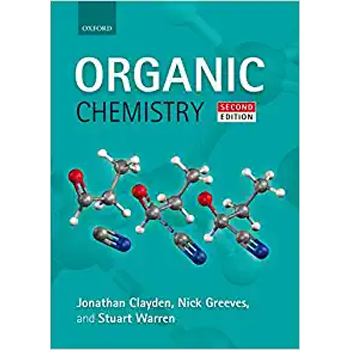
Clayden’s Organic Chemistry is many students’ and teachers’ favorite organic chemistry textbook.
The book’s second edition is based on three principles: the text has an explanatory, evidence-based, and mechanistic approach.
The author’s goal is for students to understand the material and to know the why behind chemical reactions.
It is the best organic chemistry book for many because it has careful explanations and examples from everyday life, written in a student-friendly writing style.
What makes it even more appealing is that authors admit uncertainty when there’s cause for it.
It’s worth mentioning that this book uses colors as a visual learning tool.
For example, red has the most important structures, yellow boxes are vital data and summaries, and green margin notes further explain concepts.
Note: Final chapters, such as organometallic chemistry, aren’t explained in detail.
- Has visually appealing content
- Uses real-life examples to help students assimilate different concepts
- Useful for professors for planning lectures
- The last edition came out almost ten years ago, so it’s not the most up-to-date chemistry textbook
6 - Organic Chemistry as Second Language
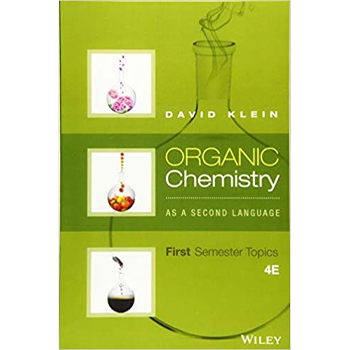
Klein has another book on the list of the best organic chemistry textbooks — Organic Chemistry as Second Language.
Compared to the Organic Chemistry Standalone, which is 1300 pages long, Second Language is only 400 pages, so this is a condensed version.
Second Language will help you understand better fundamental principles and equip you with problem-solving skills.
It omits unnecessary chemistry experiments and case studies and only includes what’s really important.
Second Language is your best chance of making organic chemistry fun and not a headache.
The book shows patterns in a clear manner. There are a lot of examples and problem exercises.
A huge plus is that all the answers can be found at the back of the book, so there’s no need to buy the answers book separately.
If you’ll take an organic chemistry course in your next semester, Second Language is a great tool to get you prepared.
Study the book a month or two before your course starts.
- Abundance of exercises
- Each chapter focuses on mastering different key skills
- Includes tips and tricks for passing organic chemistry I
- Some versions have bad printing — pages aren’t center, and the page numbers are out of order
7 - Modern Physical Organic Chemistry
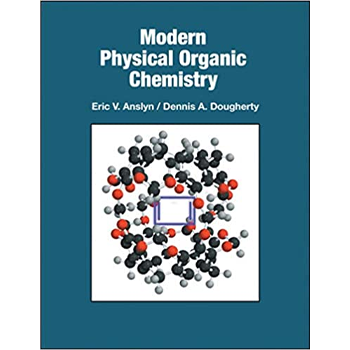
Modern Physical Organic Chemistry stands out because it connects physical and organic chemistry.
It starts with a molecular orbital theory and talks about how to build and mix simple molecular orbitals to generate more complex molecules.
It doesn’t use math to teach these lessons but instead uses visualizations.
The middle chapters focus on reactivity, kinesthetics, and mechanisms. The final chapters cover electronic structure.
The book also connects critical fields of chemistry, such as organometallic chemistry, bioorganic, and biochemistry.
It’s an excellent resource for anyone doing computational chemistry, as it goes through the basics and explains where advancements were made.
However, it isn’t the best resource if you’re just starting to learn organic chemistry.
Some previous organic chemistry knowledge is needed, such as sophomore organic chemistry courses, to understand the material.
- Covers all critical areas of chemistry
- Talks about developments in organic chemistry
- Covers computational methods
- Geared toward advanced undergraduate students and graduate students
8 - Advanced Organic Chemistry, Part A
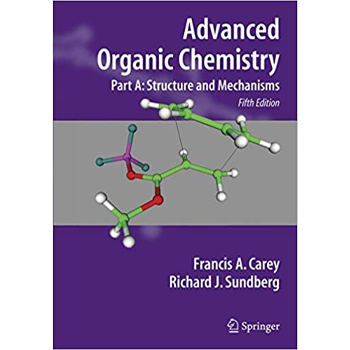
Advanced Organic Chemistry comes in two parts, A and B.
Advanced Organic Chemistry Part A goes into depth on the fundamentals of organic chemistry and all basic mechanistic types.
The fifth edition has been reorganized to provide more clarity, and it has updated material that includes advances, especially in computational chemistry.
It’s a good choice for visual students because it comes with a companion website with visual reaction guides.
On the website, you can see 3D models for the study of structure and reaction. The website also has exercise answers for instructors.
It is an easy book to follow alongside the professor’s guidance to build organic chemistry knowledge.
Note: This organic chemistry book doesn’t cover everything a graduate student should know, such as organic synthesis, organic molecules, and more. For those, you’ll also have to buy Part B.
- Comes with a companion website
- Has abundant examples for each section of reactions
- Includes all the latest advances in the field
- Poor editing, tons of conceptual and grammatical errors
9 - Organic Chemistry by T. W. Graham Solomons
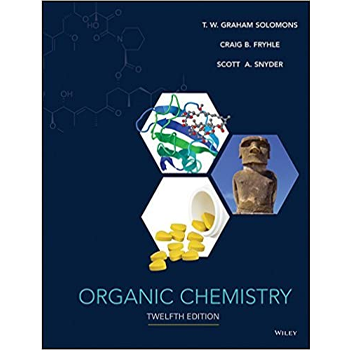
Organic Chemistry by Solomons, Fryhle & Snyder is now in its 12th edition.
The authors aim to prepare the students so they can be successful in chemistry courses.
The book’s central theme is emphasizing the link between structure and reactivity.
To do this, they organized the content in such a way to combine features of a functional approach and an approach based on understanding reaction mechanisms.
Features of functional groups are used as the basis for most chapters.
The authors use structural aspects to demonstrate organic chemistry is and mechanical aspects to show how it works.
Also, they include examples related to living systems and the physical world whenever possible, which aids student comprehension.
- Has end-of-chapter problems
- Comes in a binder version, so you can take out the chapters you need, no need to carry around a huge textbook
- Covers all the concepts of organic chemistry
- Has typos that interfere with understanding of the material
10 - Organic Chemistry I For Dummies
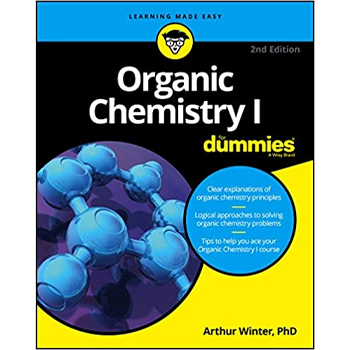
As the title says, Organic Chemistry for Dummies explains the principles of organic chemistry in simple terms.
If you’ve ever read a book from the “for dummies” series, you’ll be familiar with the concept.
It’s easy to follow and includes fun references.
It is a quick overview that can be a useful book for an introductory organic chemistry course.
It’ll help you grasp the basic principles in simple terms.
A big plus is that it includes worked-out problems. It will help you better understand organic chemistry concepts.
Essentially, it’s an OK guide if you’re just getting acquainted with organic chemistry.
It’s clear and concise and covers basic reactions. However, don’t expect the book to go into any depths.
It scratches the surface of organic chemistry, and premed and mixed science majors will be left thirsting for more.
- Conversational writing style, so you’ll go over chapters quickly
- A good complement to other textbooks that are more detailed
- Affordable
- Doesn’t focus on all key concepts of organic chemistry equally
How to Choose an Organic Chemistry Textbook?

Not all organic chemistry textbooks are suitable for everyone.
Considering that most of them are expensive, you should spend some time considering what’s the best book for you.
Here’s what to think about before you choose an organic chemistry textbook.
Are You Studying on Your Own or Taking a Class?
Start with this question, as this can make all the difference in the book you should get.
If you’re taking an organic chemistry class, your choice will be easier. The professor will often give you a list of acceptable books to choose from or tell you what book to get.
On the other hand, if you’re studying independently, you’ll need something more thorough, as you won’t have a professor to explain everything to you.
For example, in this case, I wouldn’t go for “Organic Chemistry for Dummies,” as it doesn’t cover all organic principles in sufficient depth.
Instead, choose Organic Chemistry by Klein or McMurry to get a more comprehensive foundation.
Did You Study Organic Chemistry Before, or are You Just Starting to?

Even advanced undergraduates or graduate students already in this field buy textbooks to refresh their memory on how reactions occur or to work on practice issues.
Many students need books as reference guides or want to learn about the latest developments in the field.
These students will need something more comprehensive and an advanced organic chemistry book.
However, if you’re just getting acquainted with organic chemistry, a more advanced book could be too overwhelming.
In this case, it’s better to buy something that fits your current level of organic and general chemistry and not something you’ll need years from now.
Do You Need a Companion Software with Organic Chemistry Textbook?
Organic chemistry textbooks can have 1000+ pages, and the last thing you want to do is carry it around all day long.
In this case, you can look into books in the Amazon Kindle program or look into books that come with companion software, such as Advanced Organic Chemistry Part A.
This way, you can view 3D structures and practice your problem-solving skills by doing quizzes.
How Good are You with Computation?

Think about how good you’re at math. Yes, math is a big part of chemistry, but it doesn’t mean you have to excel at it.
Some people learn better when first learning the conceptual foundations and then doing the problem-solving math questions.
If this is your case as well, look for textbooks that don’t focus on computation and mathematical parts of organic chemistry.
Think about the Number of Practice Problems
If you’re good at science, you may understand a concept by going over as little as a couple of practice issues.
On the other hand, some students need ten or more problems to understand the concept.
Everyone is different, so consider your previous chemistry experience and how many practice problems you realistically need.
Related Articles:
FAQs
What is Organic Chemistry?
Organic chemistry studies the properties, compositions, and reactions of carbon-containing compounds. [2]
It is one branch of chemistry that includes many subdisciplines, such as bioorganic chemistry, biological chemistry, analytical chemistry, polymer chemistry, physical chemistry, and many more.
If you’re looking to study subdisciplines, such as biological chemistry, you should get an actual textbook that exclusively deals with this topic.
What’s the #1 Organic Chemistry Textbook?
The #1 organic chemistry textbook is Klein Organic Chemistry.
It’s suitable for students of all levels— no matter if you’re familiar with organic chemistry or you’re just starting to get into it.
What’s the Best Organic Chemistry Textbook for Lab Work?
The best organic chemistry lab textbook is The Organic Chem Lab Survival Manual: A Student’s Guide to Techniques.
It goes over lab safety, lab equipment, how to keep a lab notebook, and everything you should know about working in a lab.
Which Organic Chemistry Textbook Should You Choose?
My vote goes to Klein’s Organic Chemistry. I like how he builds upon the common organic chemistry concepts in a way that it’s easy for students to grasp them.
There’s an abundance of practice problems — both throughout the chapter and at the end, so you can be sure you’ll have material to work on until you completely understand the issue.
The colored figures and diagrams are important for chemistry students, so they can see the shapes of different bonds, and Klein’s book does a good job of including these.
Check out the book for yourself, and you’ll have an easy chemistry journey starting today.

Our #1 Recommendation
Klein Organic Chemistry
- Great for organic chemistry beginners
- Has many colorful visuals
- Clear and concise explanations
- End-of-chapter problems so you can assess your level of understanding
About the author

Add Comment